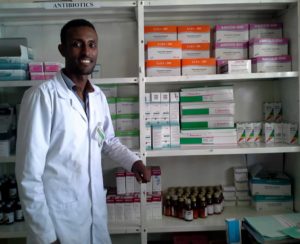Dagnachew Hailemariam has worked at Bishoftu General Hospital for six years. The hospital, located 45 km south of Addis Ababa in the town of Bishoftu, is state-owned and provides service to between 400 and 500 patients per day. Likewise, the hospital pharmacy receives orders for around 400-500 prescriptions per day.
“Six years ago, we were operating in the dark,” Dagnachew, now the hospital’s head pharmacist, recalls. “We had no procurement system for medicines, which means we bought medicines that were not essential. Many of those expired and disposing of them was a challenge. On the other hand, we ran out of essential and even vital medications—stock-outs that could have resulted in loss of life. At that time, we relied heavily on guesswork.”
Since 2009, the USAID-funded Systems for Improved Access to Pharmaceuticals and Services Program (SIAPS) and its predecessor SPS—both implemented by Management Sciences for Health—have provided support to Bishoftu General Hospital in establishing and strengthening a Drug and Therapeutics Committee (DTC). This committee works closely with the hospital management to ensure that patients are provided with the best, most cost-effective care possible by addressing issues such as availability and rational use of medicines.

Through the systems and guidelines put in place with the help of the hospital’s DTC, which was established in 2009, the hospital has decreased the expiry rate from 20% in 2009 to 4.5% in 2015—significantly cutting medication costs and increasing patient satisfaction from 55% to 90% in the same period.
“We have come a long way,” Dagnachew says. “We have our own drug list now and we use the ABC/VEN reconciliation mechanism by which we determine which drugs are needed the most and which drugs we should order in large amounts.”
Dagnachew says the establishment and improvement of systems related to medicine selection, prioritization, procurement, prescribing, dispensing and use has also helped him on a personal level. “I can take accountability for what I do now since there is a system that enables me to do that,” he says. “I can handle complaints, respond to inquiries, and carry out my duties with confidence.”
Desalegn Baysa, the CEO of the hospital, says one of the major achievements that came as a result of the Drug and Therapeutics Committee is the establishment of systems of accountability for individuals and teams. This has led to considerable changes in the quality of health care service delivery due to the improved availability and accessibility of pharmaceutical products, Desalegn says.
With the continued assistance of SIAPS Program, the Bishoftu General Hospital DTC established a Drug Information Service (DIS), which provides unbiased information on medicines to both practitioners and patients. The committee also created a system of standardizing prescription, and published guidelines in support of rational use of medicines.
“Our hospital has become the health care provider of choice for many people in and around the town because of the progress we’ve made in the last few years, Desalegn says. “We hope to do more in the coming years in collaboration with USAID and SIAPS.”

